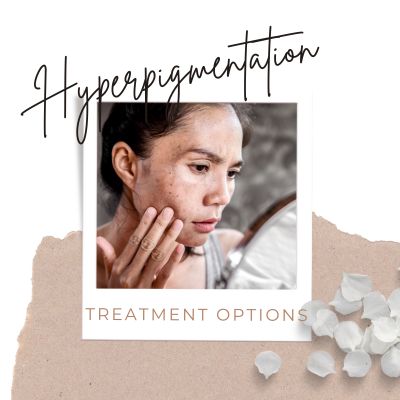Hyperpigmentation is a condition where certain areas become darker than the surrounding skin.
Manifesting as age spots, sun spots, liver spots, or general black spots on the skin, this condition is primarily caused by an overproduction of melanin, the pigment responsible for skin color.
This detailed blog delves into the causes, treatment options, and preventive strategies for hyperpigmentation, featuring insights from Dr. Hera’s Skin & Hair Clinic.

The Root Causes of Hyperpigmentation
Hyperpigmentation is a non-discriminatory condition affecting individuals of all skin types and backgrounds. The overproduction of melanin can be attributed to several factors:
– Sun Exposure: One of the most common causes leading to sun spots or solar lentigines. These are most common in areas frequently exposed to the sun.
– Hormonal Influences: Conditions like melasma are often linked to hormonal changes, notably during pregnancy or due to birth control pills, and are more common in women.
– Skin Inflammation: Postinflammatory hyperpigmentation can occur after an inflammatory skin event, such as acne, eczema, or even minor injuries.
– Medical Conditions: Certain diseases, like Addison’s disease, can increase melanin production.
– Genetic Factors: A genetic predisposition can make some individuals more prone to developing freckles or dark spots.
How Hyperpigmentation is Diagnosed
A dermatologist typically begins with a physical examination of the affected areas. Tools like a Wood lamp, which emits ultraviolet light, are used to examine the skin more closely.
In certain cases, a biopsy may be necessary to exclude other serious skin conditions.
Comprehensive Treatment Options
Treating hyperpigmentation involves a multifaceted approach:
– Topical Creams: These include prescription and over-the-counter options containing hydroquinone, azelaic acid, glycolic acid, kojic acid, and vitamin C, which can lighten dark spots over time.
– Advanced Dermatological Procedures: Options like chemical peels, cryotherapy, and laser skin resurfacing are effective but require professional oversight and are often available at specialized clinics like Dr. Hera’s.
– Preventive and Lifestyle Changes: Regularly applying sunscreen with high SPF, avoiding peak sun hours, and wearing protective clothing are crucial for preventing further hyperpigmentation.
Here’s a table summarizing information about hyperpigmentation and its types:
| Type of Hyperpigmentation | Description |
| Age Spots | Small dark spots from sun exposure. |
| Sun Spots | Round spots caused by UV radiation. |
| Liver Spots | Brown spots due to aging and sun. |
| Causes | Factors Leading to Hyperpigmentation |
| UV Radiation | Sun exposure is the main culprit. |
| Aging | Skin becomes more susceptible with age. |
| Genetics | Genetic predisposition can play a role. |
| Prevention and Treatment | Ways to Address Hyperpigmentation |
| Sunscreen | Use SPF to prevent and protect skin. |
| Topical Treatments | Creams with ingredients like hydroquinone. |
| Dermatologist Consultation | Seek professional advice for treatment. |
| Lifestyle Habits | Healthy Skin Practices |
| Diet and Hydration | Eat a balanced diet and stay hydrated. |
| Avoid Smoking and Alcohol | These habits can accelerate skin aging. |
| Manage Stress | Stress reduction can benefit your skin. |
Always consult a dermatologist for personalized guidance and treatments.
Dr. Hera’s Skin & Hair Clinic: A Center of Excellence in Dermatology
Dr. Hera’s Skin & Hair Clinic in Roorkee is renowned for its state-of-the-art treatments and experienced dermatologists.
The clinic specializes in treating various forms of hyperpigmentation, offering personalized solutions from laser treatments to targeted topical therapies. Their approach is not only to treat, treat, and educate patients on managing and preventing black spots on the skin.
Prevention: The First Line of Defense
Effective prevention of hyperpigmentation involves more than just sunscreen application. It includes understanding the importance of comprehensive sun protection and integrating physical sun blockers like titanium dioxide or zinc oxide into your routine.
Additionally, a healthy skin care regimen tailored to your skin type plays a crucial role in maintaining overall skin health and preventing pigmentary changes.
Navigating Life with Hyperpigmentation
While hyperpigmentation is often a chronic condition, many patients see a significant reduction in dark spots with the right treatment plan.
Consistency and patience with treatments are key, as results can take time to manifest. Recognizing that hyperpigmentation is a common skin concern can also aid in coping with the condition.
The Importance of Professional Care
For those facing persistent or worrisome changes in their skin pigmentation, seeking professional medical advice is crucial.
In Roorkee, Dr. Hera’s Skin & Hair Clinic offers expert dermatological care, where specialists can provide comprehensive assessments and tailored treatment plans.
Concluding Thoughts
Hyperpigmentation, encompassing conditions like age, sun, and liver spots, can be effectively managed with targeted treatments, preventive measures, and expert guidance.
Dr. Hera’s Skin & Hair Clinic in Roorkee is a premier destination for those seeking personalized care and advanced treatment options.
Remember, diligent sun protection is one of the most effective ways to prevent and mitigate hyperpigmentation.
